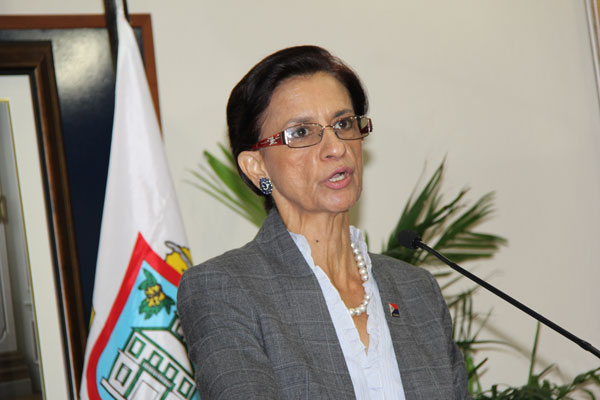 Philipsburg:--- Prime Minister Sarah Wescot Williams at the Council of Ministers' weekly press conference on Wednesday said one of the things discussed with the Minister of Kingdom Relations Ronald Plasterk who visited the island for the first time earlier this week was the dramatic increase in fares by WINAIR to travel to Saba or St. Eustatius. Wescot Williams said the route is costly since the Netherlands Antilles dismantled.
Philipsburg:--- Prime Minister Sarah Wescot Williams at the Council of Ministers' weekly press conference on Wednesday said one of the things discussed with the Minister of Kingdom Relations Ronald Plasterk who visited the island for the first time earlier this week was the dramatic increase in fares by WINAIR to travel to Saba or St. Eustatius. Wescot Williams said the route is costly since the Netherlands Antilles dismantled.
Wescot Williams said that somehow the Minister of Kingdom Relations was given the impression that there are a lot of taxes added to the fares. She said government conducted a research on the matter and the cost for these flights could be considered high due to the short duration of the flights. The Prime Minister said that when WINAIR was under the former Netherlands Antilles it was subsidized by the former Antillean Government in order to keep the rates lower. She said when these subsidies stopped the company almost collapsed, however, since the restructuring the company had to look at the routes and the costs and they have since put together a business plan that is now being executed. Wescot Williams said that the BES (Netherlands) has a small percentage of shares in WINAIR.
SMN News conducted its own research on the increase in fares and we were told that the Dutch Government conducted a study on the operations of WINAIR and in their report they made clear that they were not going to inject monies in the company. The report clearly states that WINAIR has to be able to sustain itself.
The research conducted by SMN News shows that since the new approach the fares of St. Eustatius increased by 30%. The ticket itself costs $149, fuel surcharge is $7.80, Airport tax $35.bringing the total cost for a ticket to St. Eustatius at $191.80 if the ticket is purchased at the Airport. Agencies that sells tickets for WINAIR adds either 10% or 12% for their service fee depending on the agency where the ticket is purchased. Passengers traveling to the island can also get a lower fare which costs $157.80 including airport tax and all other taxes which remained unchanged. A ticket to Saba costs $175.60 since their increase was a mere 5%.
Fiber Optic Cable Issue.
Wescot Williams said that another issue that was discussed during the meeting is the fiber optic cable that the BES islands wants to pass through St. Maarten. Wescot Williams said St. Maarten is looking for solutions to this but while doing so the government of St. Maarten cannot and will not compromise its people and the investments that were made by TELEM. She said the government of St. Maarten has to weigh the pros and cons of having a fiber optic cable on the island because if that happens and services are sold to St. Maarten clients then it will directly affect TELEM Group of companies.
Wescot Williams said the agenda points were St. Maarten's financial situation, issues regarding the joint central bank, and the cooperation with the Netherlands. She said that regarding the joint central bank of Curacao and St. Maarten, both governments have expressed their wishes to have the issues resolved. "The government of Curacao is anxious to solve this issue, while St. Maarten has indicated that they want to have an evaluation on the workings of the monetary union and Curacao also feels the same way. The Governing Agreement that was signed by the current government of Curacao indicated in the agreement that it is considered desirable to evaluate the monetary union with St. Maarten." Wescot Williams said the most positive thing right now is that both governments want to come to a solution quickly with antagonism and aggression.
Wescot Williams said that St. Maarten has been clamoring for the balance of the debt relief. She said that has been going on for some time now and it will continue for a while. The Prime Minister further explained that even though St. Maarten was due to have 180 million guilders in the debt relief program so far the new country only received 65 million that was paid to the APNA. She said that St. Maarten is not only looking for its money but it has to be made clear that St. Maarten did not kick off with the so-called healthy financial position as assumed widely. Wescot Williams said instead of St. Maarten getting the healthy start off financially, the island inherited part of the outstanding Antillean debt to a tune of more than 200 million guilders. Wescot Williams said when the law on the CFT was drafted no one knew what it would cost for the CFT plans of approach. She said the plans of the approach for the various departments have to be financed by the local budget. She said that one of the main issues and message that St. Maarten gave the Minister is that the Dutch Government must be prepared to discuss the reality of St. Maarten's current situation which was mostly caused by the debt relief that was not given to the island as agreed upon prior to the dismantling of the Netherlands Antilles.